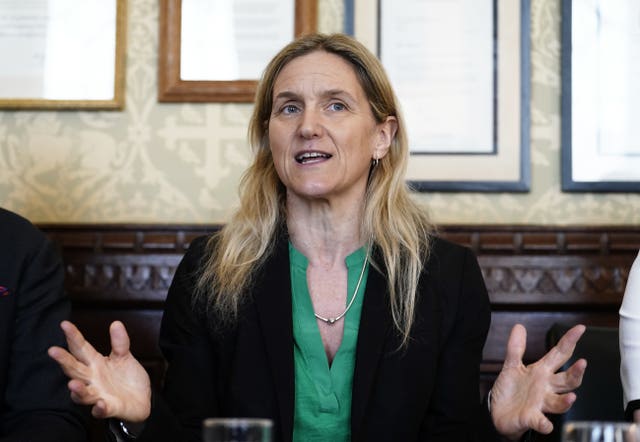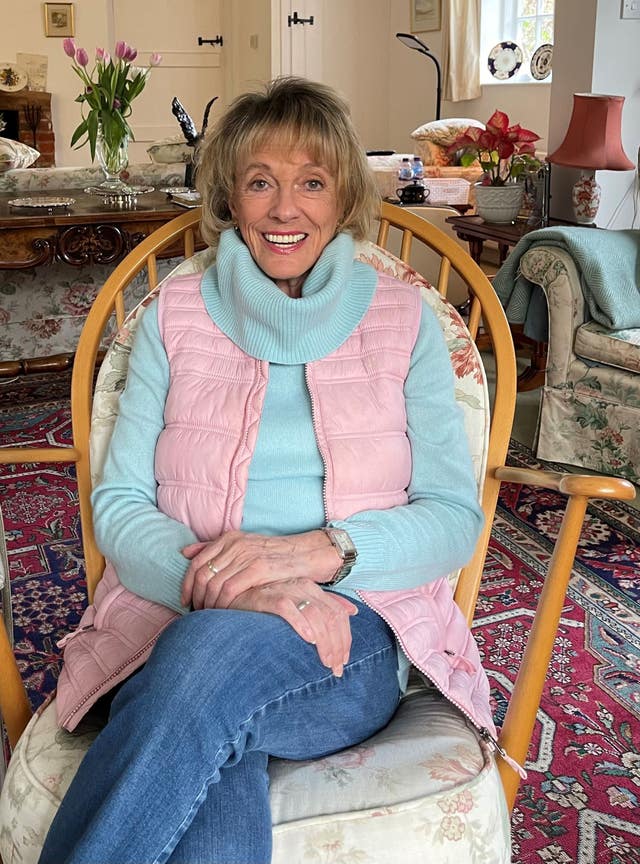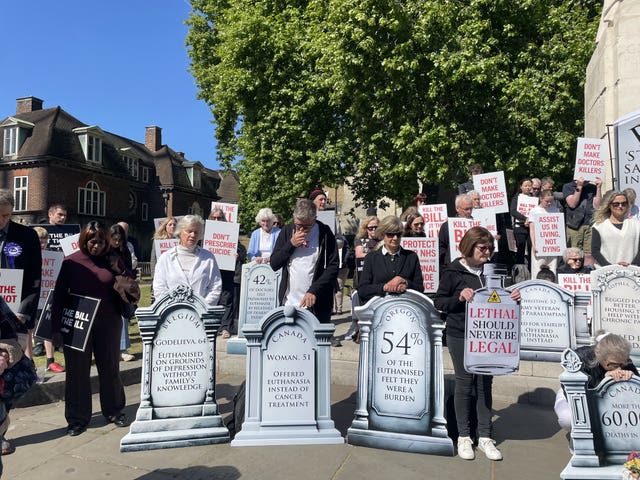Care homes and hospices must have right to opt out of assisted dying, MPs hear
The Government is neutral on the Bill and any votes MPs make are according to their own conscience rather than along party lines.

Concerns around the prospect of care homes providing assisted dying and the risks of patients turning to Google if not given all the options by a doctor have been raised in Parliament as the controversial topic was once again debated by MPs.
Demonstrators gathered outside Parliament as the Terminally Ill Adults (End of Life) Bill came back to the Commons for the first time since a historic yes vote in November saw a majority of MPs support the principle of assisted dying.
Dame Esther Rantzen, who is terminally ill and is one of the most high-profile backers of the Bill, appealed for MPs to vote for what she termed a “crucial reform”.
She urged them to change the law “as so many other countries have, not for me and for those like me who are running rapidly out of time, but for future generations to have the right if necessary, not to shorten their lives, to shorten their deaths”.
Dame Esther also suggested many MPs opposed to the Bill have “undeclared personal religious beliefs which mean no precautions would satisfy them”.
But Labour’s Jess Asato criticised the Childline founder’s comments as “distasteful and disrespectful”.
Opponents have argued the Bill does not have enough safeguards and has been rushed through, with two royal medical colleges voicing their doubts on the legislation in its current form.
Among those opposed to the Bill, Paralympian Baroness Tanni Grey-Thompson – who would have a vote on the Bill should it make its way to the Lords – has argued the Bill has “not been made safer”, criticising the scrapping of the much-lauded High Court safeguard in favour of expert panels.
Other changes made to the Bill – which concerns only England and Wales – in recent months during a weeks-long committee process include the timeframe in which an assisted dying service might come into effect being doubled to four years from royal assent.
In its current form the Bill would mean terminally ill adults with only six months left to live could apply for assistance to end their lives, with approval needed from two doctors and the expert panel.

It is possible this part of the parliamentary process, known as the report stage, will run into a second day next month, meaning a vote on approval or rejection of the overall Bill would not take place on Friday.
Bringing her Bill back to Parliament, Labour MP Kim Leadbeater said assisted dying must be legalised to avoid terminally ill people acting out of desperation or making “traumatic” trips to Switzerland.
As Friday’s session – which could last for up to five hours – opened, she told MPs gathered in the Commons: “Put simply, if we do not vote to change the law, we are essentially saying that the status quo is acceptable.”
Referring to stories she had heard of people dying in “deeply difficult and traumatic circumstances”, she added: “Too many have seen their terminally ill loved ones take their own lives out of desperation, or make the traumatic, lonely and costly trip to Switzerland, and then face a police investigation while dealing with their grief and loss.”
Following a Royal College of Psychiatrists (RCPsych) statement this week on its “serious concerns” including on numbers of psychiatrists available to sit on panels assessing a terminally ill person’s application, Ms Leadbeater told MPs said she “wouldn’t anticipate any problems” on staffing.

Amendments being discussed on Friday included ensuring care homes and hospices can decide whether or not to be involved in assisted dying and that their funding would not be affected based on their decision.
Conservative MP Rebecca Paul, who tabled both amendments, said they “provide important protections” which she argued “are currently lacking in the Bill”.
She told MPs: “Whether you’re in favour of assisted dying or not, we must preserve the rights of organisations, companies and charities to choose whether to offer it. They must never be bought into it by public funding being conditional on the provision of assisted dying.”
Conservative former minister Sir Edward Leigh used his speech to express the views of a care home manager who spoke of the “unworkable nature of individual exclusion from the processes of assisted dying in social care environments”
Quoting the care home boss, he said: “Specific exclusion of the care home sector should be a feature of the Bill. In any case, organisations and sites should and must be given the ability to exclude themselves from the act of assisted death.”
Elsewhere, Labour’s Dame Meg Hillier spoke of her concern that patients could “feel pressured into ending their lives” if doctors are able to raise the prospect of assisted dying with patients first in a conversation.
Dame Meg has urged MPs to support her amendments which would mean that could not happen, and that health professionals could not raise the topic with under-18s.
She said the issue is “a very difficult thing for a lot of people to understand, but particularly for young people” and warned of adolescents being “more likely to take risks”.

Alliance MP Sorcha Eastwood said there was additional danger presented by social media on the topic, telling the Commons she had heard “almost all of our young people across the UK are having their mental health impacted by social media”.
She said: “If we throw this into the mix, this has the potential to do untold damage.”
But Liberal Democrat MP Christine Jardine suggested patients not being given “all the options” by medical professionals could see them, particularly young people who might be active on social media, tempted to search online for their own information.
She said: “The automatic reaction is to go and Google everything, in fact we all do it … the danger is if they are not told all the options, if they are not given the guidance that’s available, then they will go to Google and what we will see is yet more of the dangerous suicide attempts that we see at the moment.”
The Government is neutral on the Bill and any votes MPs make are according to their own conscience rather than along party lines.





